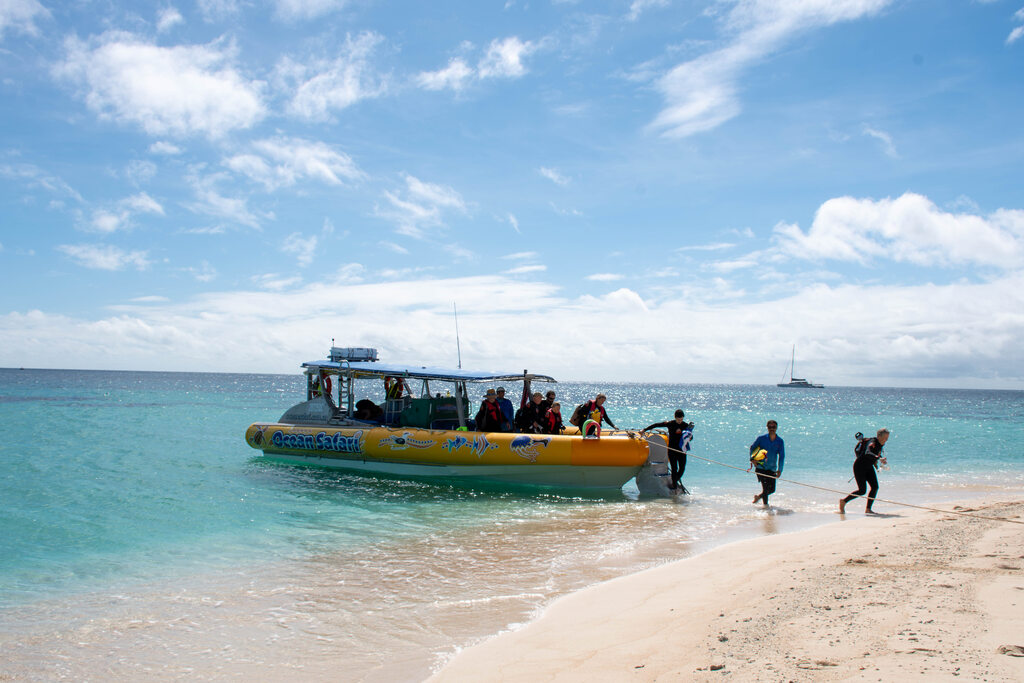
Ocean Safari’s mission to protect a natural wonder
VOICES OF THE REEF
When you visit the Great Barrier Reef, it’s important to do it responsibly, not just for the experience, but to help protect the reef itself. One operator helping make that possible is Ocean Safari, an eco-tour company that runs several reef conservation programs.
Operating from Cape Tribulation, Ocean Safari offers small, half-day tours to Mackay Reef, giving visitors an up-close look at the vibrant reef just off the Daintree coast
But what makes them stand out is more than the scenery, it’s their deep-rooted commitment to conservation and reef education.
We spoke with Ocean Safari’s general manager, Cole Claxton, to talk about what it means to witness reef change firsthand, and how eco-tourism can drive reef protection.
Cole has spent decades exploring the Great Barrier Reef and has witnessed both its devastation and recovery.
“The reef is incredibly complex and fragile, small changes in water quality or temperature can have a huge impact,” he said.
“But I’ve also seen reefs bounce back stronger than before. Their resilience never stops surprising me.
“Visiting a site after a heat event or cyclone is always nerve-wracking. Places I knew and loved were completely wiped out, chocolate brown water, total carnage.
“There was this deep sense of loss and uncertainty. You wonder, will it ever come back?”
Each summer brings fresh concern - cyclones, bleaching events - but Cole said nature often finds a way.
“You return to those same sites and suddenly there’s colour, life, and stunning coral cover again.
“Mackay Reef in particular baffles me. Even after stress from floods or heat, it rebounds. That gives me hope.
“What I’ve learned is that the GBR is too vast and complex to generalise, while we can’t take it for granted, we also shouldn’t underestimate its ability to recover.”
Education at the core
Ocean Safari’s conservation work goes beyond low-impact tours.
As part of the Tourism Reef Protection Initiative (TRPI), they run Reef Seeker, a hands-on program where visitors become “marine biologists for a day”, helping survey reef health and contributing data to the Marine Park’s monitoring systems.
“Students take part in in-water surveys, recording key fish species, coral health, algae, and water conditions,” Cole said.
Their findings are compared with a guide’s data and submitted to the Marine Park Authority.
“It’s really rewarding to see natural curiosity sparked in young people and channelled into reef science,” Cole said.
“Sometimes you can just tell it was a life-changing trip, and that student is going to pursue science, eco-tourism, or conservation.”
Ocean Safari also maintains a dedicated TRPI stewardship site at Mackay Reef, where the crew conducts daily surveys and controls crown-of-thorns starfish, one of the biggest threats to coral reefs, as they feed on living coral tissue.
Their natural predator, the triton snail, is now rare due to overharvesting, causing crown-of-thorns numbers to grow unchecked.
Research shows physical removal can cause the starfish to multiply, so the crew uses precise vinegar injections, the most effective and reef-safe method.
As part of their tours, guests visit the stewardship site and are given an educational presentation on Ocean Safari’s reef monitoring efforts.
The crew highlights coral species and their estimated ages, key indicator species, visible stressors, and current environmental factors affecting reef health.
A model for responsible tourism
Being based in the remote Daintree, Cole said, is a constant reminder of the environment’s power, and fragility.
“We’re surrounded by the oldest rainforest on one side, and the Reef on the other. It makes you want to do better, and show others why it matters.”
For those feeling helpless about the reef’s future, Cole offers this:
“What we do on land affects the ocean - what we buy, how we fish, how we treat the coast, it all counts.
“But also don’t underestimate the reef. It’s more resilient than we think, and there’s still time to protect it.
With better fisheries management, improved water quality, and reef education, he believes the reef can thrive.
“We want people to experience its untouched beauty, and take that connection home. Once you’ve seen it, you’ll want to protect it too.”
Did you enjoy this article?
Help us continue to bring you stories that resonate with your community. Please consider supporting below.
Got a news tip?
Send a news tip or submit a letter to the Newsport Editor here.
Comments
Comments are the opinions of readers and do not represent the views of Newsport, its staff or affiliates. Reader comments are moderated before publication to promote valuable, civil, and healthy community debate. Visit our comment guidelines if your comment has not been approved for publication.

